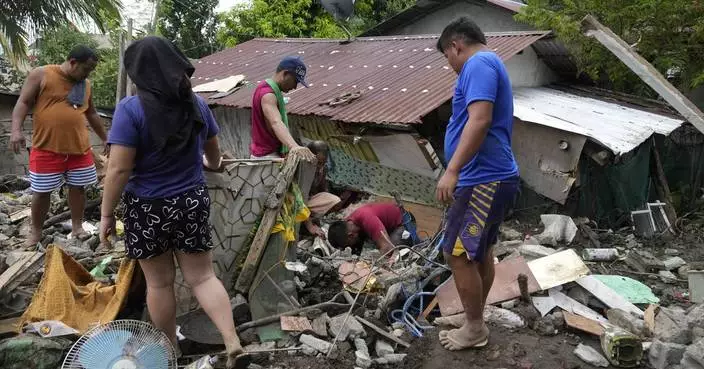PRISTINA, Kosovo (AP) — European Commission President Ursula von der Leyen on Saturday denounced Russia's hybrid attacks against democracies, saying the European Union is fighting daily to debunk misinformation.
Von der Leyen was in Kosovo as part of a trip this week to aspiring EU member states in the Western Balkans to assure them that enlargement remains a priority for the 27-nation bloc.
Von der Leyen denounced Russia's efforts “to destabilize these democracies,” adding that Brussels works to unveil propaganda “to the benefit of a whole region.”
“It is possible for us to stand up with the truth and with transparency and with very clear messaging. So here we are really countering a hybrid attack that Russia is leading against democracies,” she said at a news conference in the capital, Pristina.
Von der Leyen came to Kosovo from neighboring Serbia, which has close ties to Russia and has refused to join international sanctions on Moscow over its invasion of Ukraine.
She did not mention the 13-year-old EU-led dialogue to normalize ties between Serbia and its former province, Kosovo, instead focusing on EU efforts to develop the region's economy.
Kosovo-Serbia ties remain tense, even 25 years after NATO’s 78-day bombing campaign in 1999 that ended a war between Serbian government forces and ethnic Albanian separatists in Kosovo, which left about 13,000 people dead, mainly ethnic Albanians. Kosovo proclaimed independence in 2008, which Belgrade has not recognized.
Last year EU officials offered a 6-billion-euro (about $6.5 billion) growth plan to the Western Balkan countries in an effort to double the region’s economy over the next decade and accelerate their efforts to join the bloc. That aid is contingent on reforms that would bring their economies in line with EU rules.
The Western Balkan countries — Albania, Bosnia, Kosovo, Montenegro, North Macedonia and Serbia — are at different stages in their applications for EU membership. The countries have been frustrated by the slow pace of the process, but Russia’s invasion of Ukraine in February 2022 has propelled European leaders to push the six to join the bloc.
The Commission on Wednesday approved the reform agendas of Albania, Kosovo, Montenegro, North Macedonia and Serbia following a green light from EU member states. That was a key step to allow payments under the growth plan upon completion of agreed reform steps.
Von der Leyen's trip concluded with a visit to small Montenegro, a NATO member state which is seen as the first in line for EU membership. Von der Leyen praised Montenegro's effortson the EU path, saying “we are now closing one chapter after another.”
Montenegro's government is a cohabitation between pro-EU and pro-Russian factions. Von der Leyen urged unity in the divided nation to achieve progress toward EU membership.
“I want to assure you that, like in my first mandate, enlargement will be at the top of the political agenda for the next five years," said von der Leyen. “We have now all the necessary tools, all the necessary instruments in place, so let’s make it happen, let’s make it a reality, and work towards this common goal.”
AP writer Predrag Milic contributed from Podgorica, Montenegro.
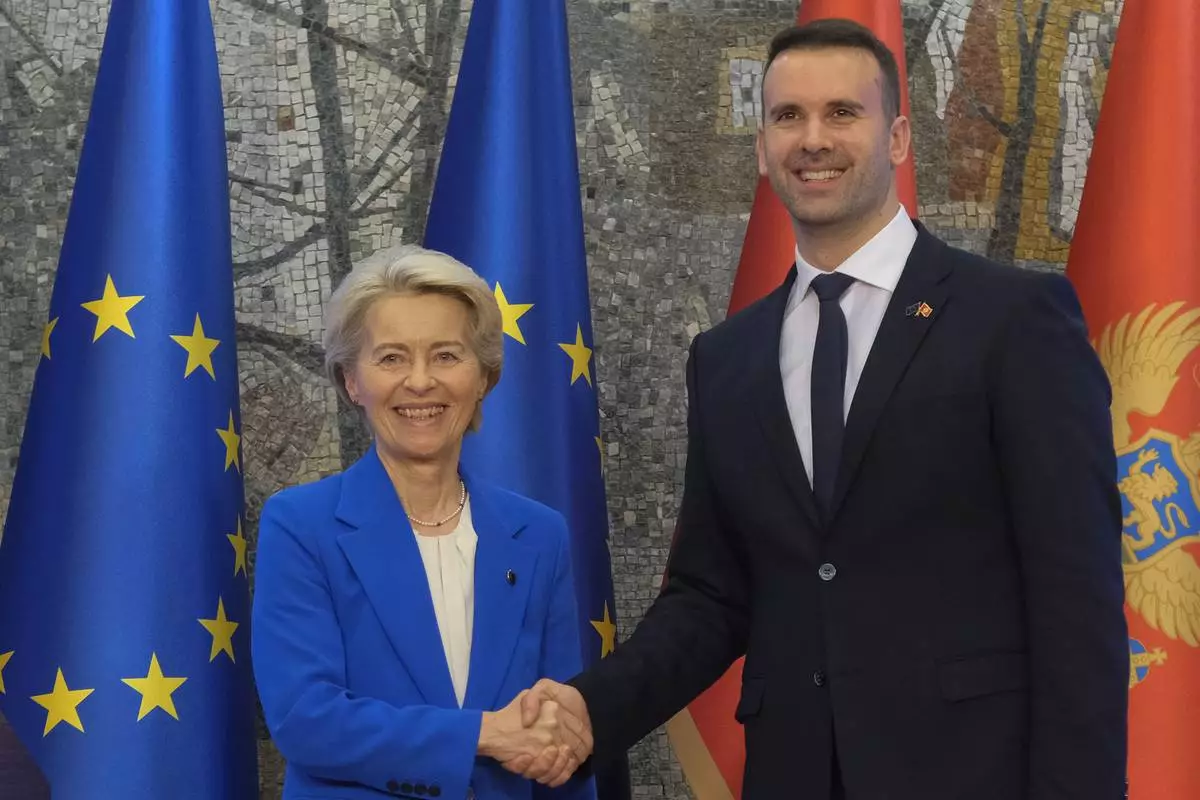
Montenegro's Prime Minister Milojko Spajic, right, shakes hands with European Commission President Ursula von der Leyen in Podgorica, Montenegro, Saturday, Oct. 26, 2024. (AP Photo/Risto Bozovic)
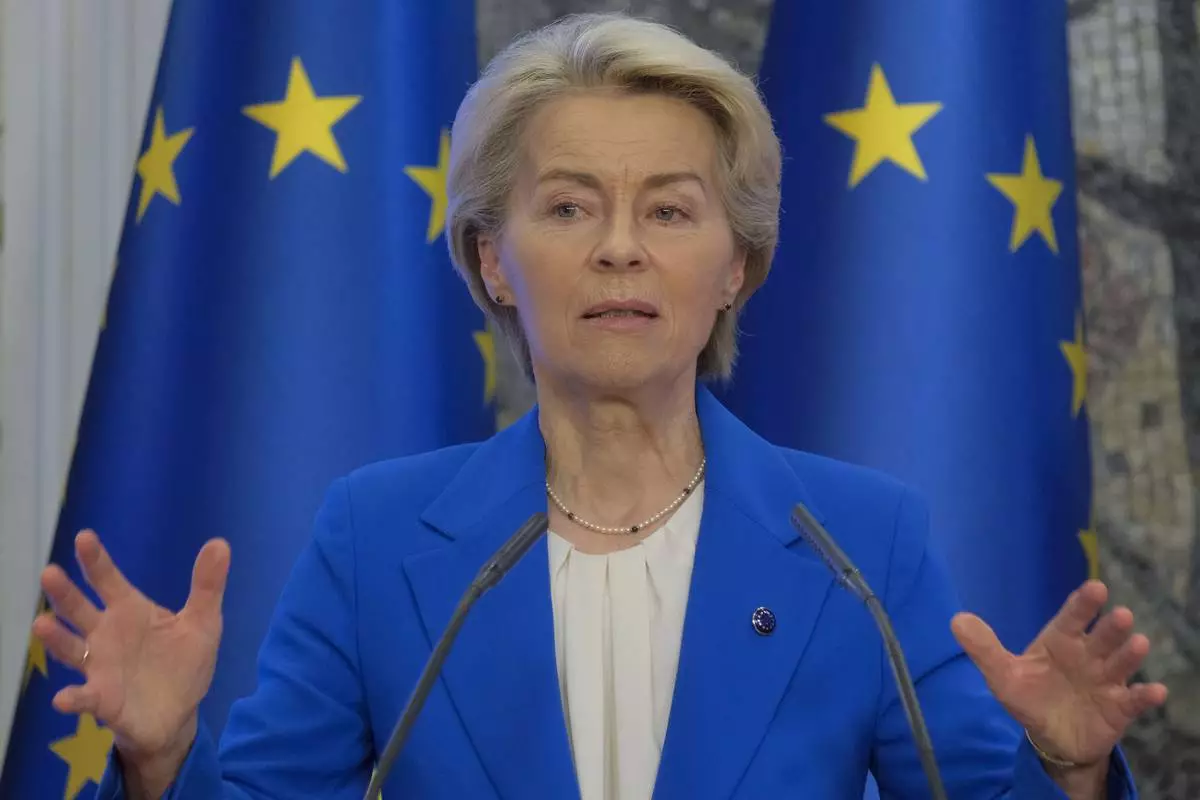
European Commission President Ursula von der Leyen speaks during a media conference after talks with Montenegro's Prime Minister Milojko Spajic in Podgorica, Montenegro, Saturday, Oct. 26, 2024. (AP Photo/Risto Bozovic)
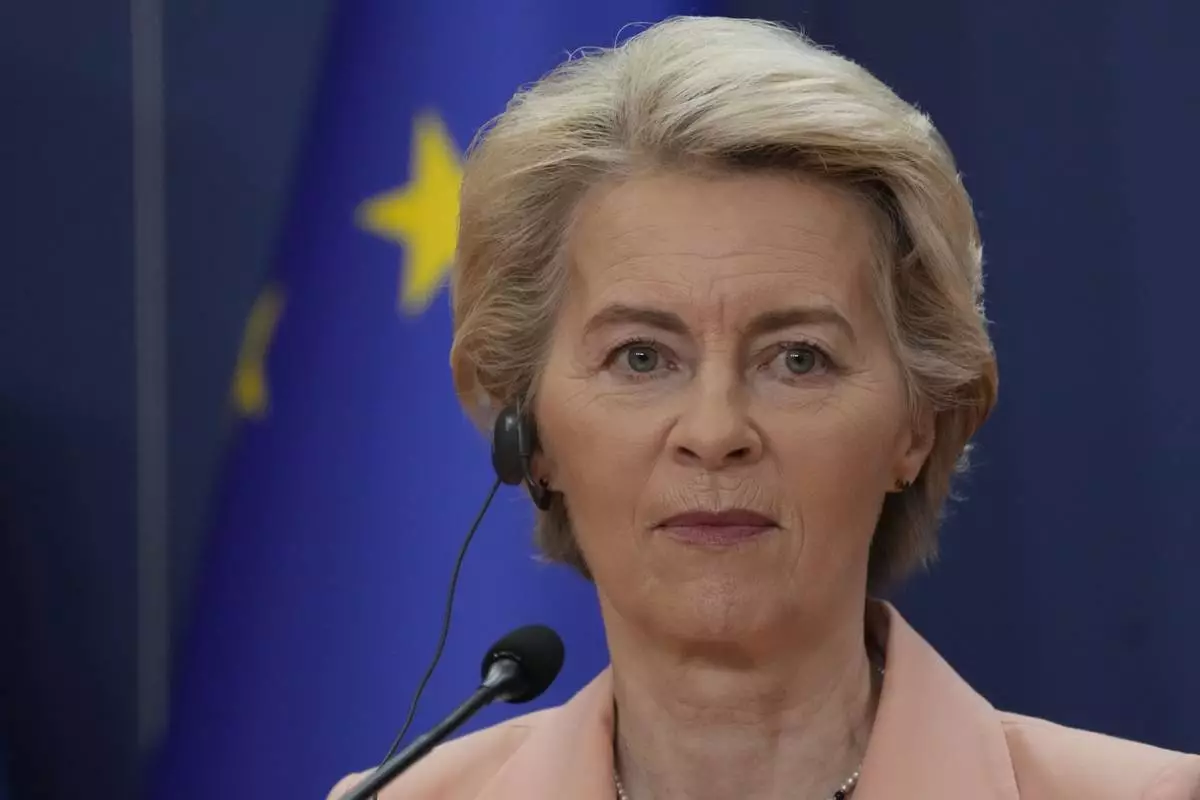
European Commission President Ursula von der Leyen listens to Serbian President Aleksandar Vucic during a news conference at the Serbia Palace in Belgrade, Serbia, Friday, Oct. 25, 2024. (AP Photo/Darko Vojinovic)
In his three-hour interview with podcaster Joe Rogan, Donald Trump dug in on his false claims about voting, election fraud and his loss in the 2020 presidential election. Rogan helped encourage some of these claims.
The interview, released late Friday, came on the same day that the former president, on his social media network, re-posted threats to prosecute lawyers, voters and election officials he deems to have “cheated” in the 2024 election.
Here's a look at some of the claims by the Republican nominee for president and the truth.
WHAT TRUMP SAID: “I won by like — they say I lost by like — I didn’t lose.”
THE FACTS: Trump did lose in 2020 to Democrat Joe Biden. Trump's claims that fraud cost him the race were investigated repeatedly.
Trump's own attorney general said there were no signs of significant fraud. The Republican-run state Senate in Michigan, one of the swing states where Trump claimed fraud occurred, came to the same conclusion after a lengthy investigation. An investigation by the nonpartisan Legislative Audit Bureau in Wisconsin, ordered by the state's GOP-controlled Legislature in another state Trump claimed to have been defrauded from winning, also found no substantial fraud.
Rogan chortled when Trump was arguing, correctly, that his loss was close. Trump lost the election narrowly in six swing states. If about 81,000 votes had flipped, Trump could have won Arizona, Georgia, Nevada and Wisconsin and gotten enough support in the Electoral College to remain president.
Trump misstated that margin as 22,000 votes.
WHAT TRUMP SAID: “What happened is judges don’t want to touch it. They would say, ‘you don’t have standing.’ They didn’t rule on the merits.”
THE FACTS: That’s not true. Trump and his supporters lost more than 50 lawsuits trying to overturn the election.
A group of Republican-affiliated election lawyers and legal scholars reviewed all 64 of the Trump lawsuits challenging the 2020 election and found only 20 of them were dismissed by judges before a hearing on the merits. In 30 cases, the rulings against Trump came after hearings on the merits.
In the remaining 14 cases, the report for Stanford University's Hoover Institution found, Trump and his allies dropped their lawsuits before they even got to the merits phase. “In many cases, after making extravagant claims of wrongdoing, Trump’s legal representatives showed up in court or state proceedings empty-handed, and then returned to their rallies and media campaigns to repeat the same unsupported claims,” the report states.
WHAT TRUMP SAID: “We should go to paper ballots.”
THE FACTS: Trump and Rogan both argued that voting machines are unreliable and that the United States should rely on paper ballots. Trump even cited his billionaire tech mogul supporter Elon Musk's enthusiasm for such a change.
Almost all of the country already made that switch, however.
In 2020, more than 90% of the election jurisdictions in the U.S. used paper ballots, according to the Brennan Center for Justice. The next year, the federal Election Assistance Commission changed its guidelines to recommend every jurisdiction use paper.
The only state not to use a voting system with paper ballots or a paper trail of any sort is Republican-run Louisiana.
WHAT TRUMP SAID: “They used COVID to cheat.”
THE FACTS: Trump's central argument is that a grand Democratic conspiracy changed voting procedures during the coronavirus pandemic to make mail voting more popular and that the conspirators then rigged the election against him through those mail votes. That's not what happened.
When the pandemic first hit during the 2020 presidential primary in March, Republican and Democratic election officials quickly switched to encourage mail voting to avoid crowded polls. This was relatively uncontroversial until Trump turned against it, claiming it would lay the seeds for potential fraud.
In doing so, Trump was returning to his usual playbook, claiming that any election he doesn't win is fraudulent. He made that claim about the first contest he lost, Iowa's 2016 Republican caucus. He even claimed he lost the popular vote in 2016 because of voting by illegal immigrants, though a presidential commission he empaneled to find evidence of it disbanded without finding any proof.
THE FACTS: Isolated cases of voters fraud have long occurred, but in modern times have not reached the levels needed to sway a national election. An Associated Press review found fewer than 475 cases in all six battleground states that Trump lost by more than a combined 300,000 votes — far too little to change the outcome.
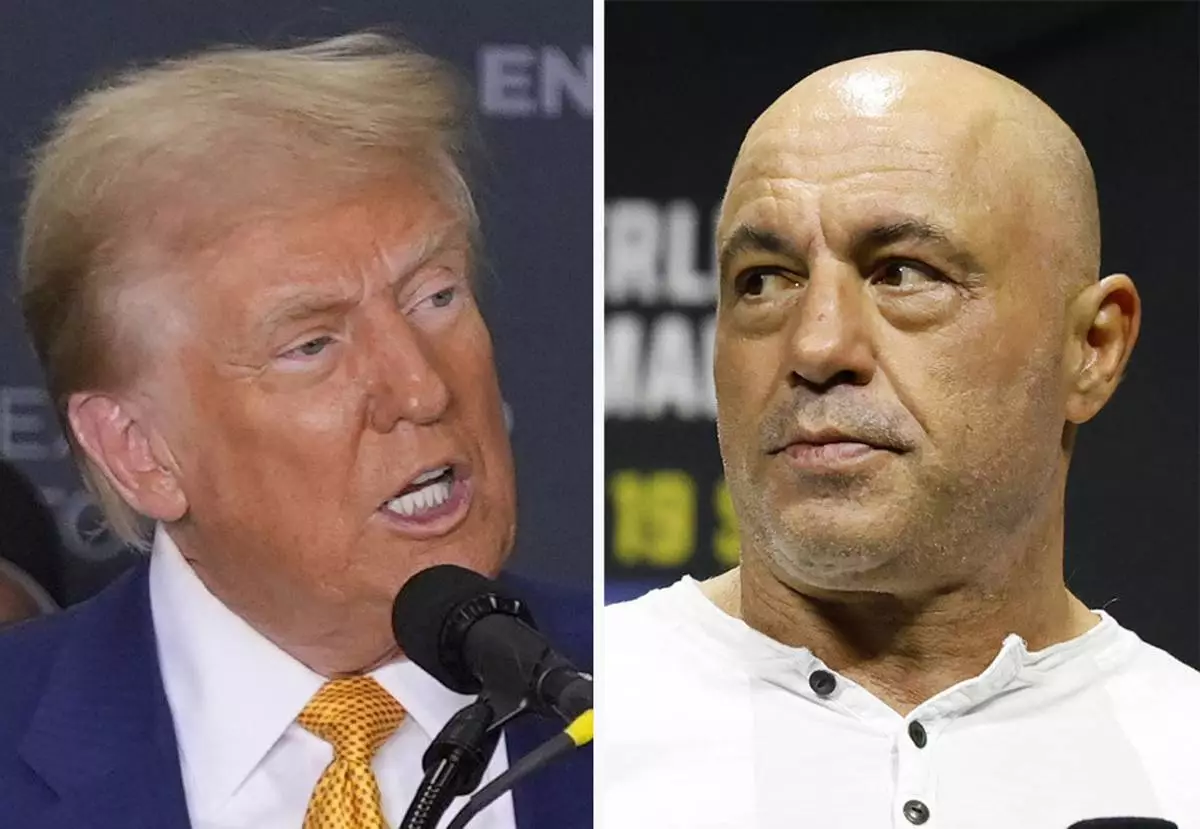
This combination photo shows Republican presidential nominee former President Donald Trump speaking during a news conference, Oct. 25, 2024, in Austin, Texas, left, and Joe Rogan at a UFC event, Aug. 18, 2023, in Boston. (AP Photo)










